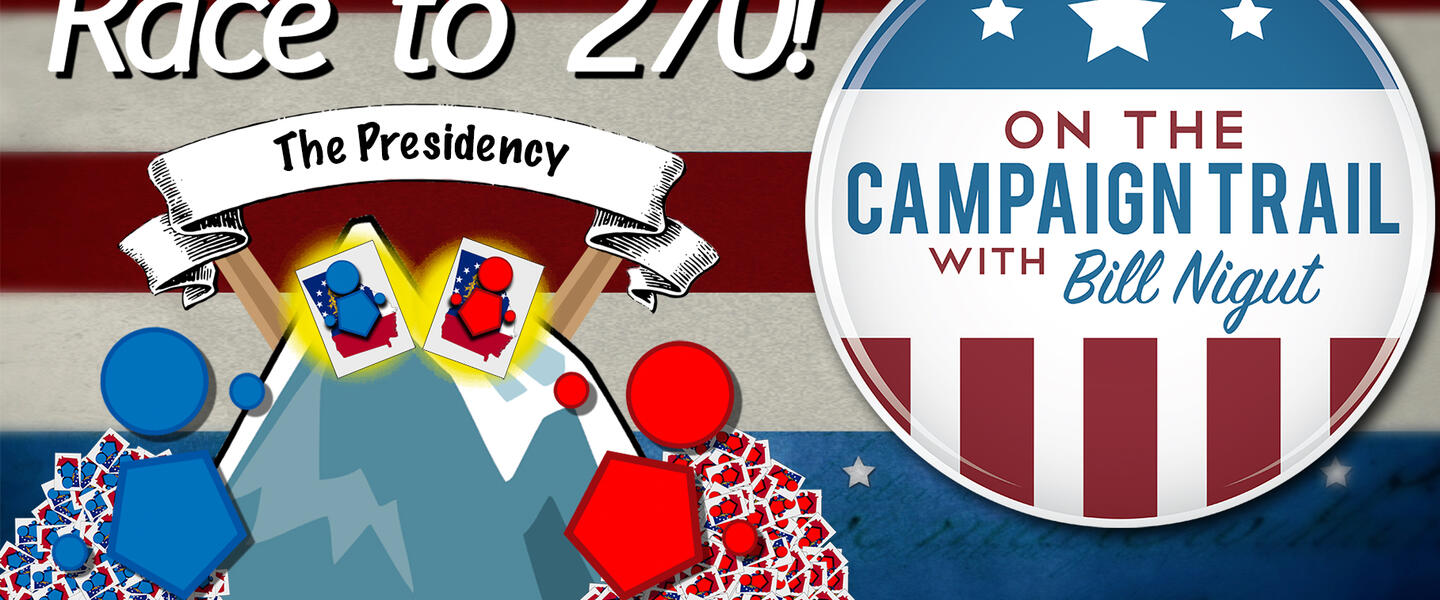
Section Branding
Header Content
Race to 270!
Primary Content

On your mark, get set, go! The presidential nominees are in a race to the White House and the magic number of electoral votes needed to win the presidency is 270! In this episode of On the Campaign Trail with Bill Nigut, “Race to 270!,” students will learn about the general election. Specifically, Bill will explain the difference between the popular and the electoral vote, how the number of electors is determined per state, and the importance of swing states. After watching this video, students will also be able to identify key states with large numbers of electoral votes and explain why candidates focus on some states more than others.
“Race to 270!” is aligned to SSCG15 of the Georgia Standards of Excellence for American Government and Civics. Use our discussion questions to help facilitate meaningful conversations with your students, and take a look at the chart below to review any of our previous episodes.
| Episode | Description | Resources | GPS |
|---|---|---|---|
| Episode 1: That's Debatable | Explains the importance of debates in the political process, their overall structure and how this debate differs from those students will watch during the general election. | Debate Watch Guide Debate the Winner Debate Discussion |
SSCG15 |
| Episode 2: My Government, My Vote, My Voice | Discusses the topic of democracy and provides insight on the difference between representative and parliamentary democracies and their overall contrast to autocracies and oligarchies. | SSCG1 | |
| Episode 3: Do You Qualify | Discusses the constitutional and unwritten qualifications for becoming president. | Discussion Questions Campaign Activity Qualifying People |
SSCG10 |
| Mini Episode: Campaign Update | Students will find out where candidates from both political parties stand in national polls and how Iowa’s February 1st caucus and New Hampshire’s mid-February primary may impact those presidential nominees. | Discussion Questions | SSCG15 |
| Episode 4: Role Call: The Seven Roles of the President | Students learn about the seven main roles of our president and the responsibilities attached to each one. | SSCG10 | |
| Episode 5: Narrowing the Field | Host Bill Nigut underscores the purpose of primaries and caucuses, gives details on Georgia’s open primary, and discusses why the state has chosen to participate in the SEC primary. | Discussion Questions Hold Your Own Primary Journey to the White House |
SSCG15 |
| Episode 6: Party Over Here, Party Over There | Provides a breakdown of political parties, the different types of party systems, and the overall ideological differences between Democrats and Republicans. |
Discussion Questions Party Over Here Activity |
SSCG15 |
| Mini Episode: Campaign Update | Campaign Update Inform students about what’s going on in the 2016 presidential election before Super Tuesday with this quick mini episode of On the Campaign Trail with Bill Nigut. | Discussion Questions | SSCG15 |
| Episode 7: Lights, Camera, Action |
Bill Nigut explains the role the media plays during elections and how this year’s presidential hopefuls are using social media more than ever before. |
Discussion Questions | SSCG15 |
| Episode 8: Conventions and Candidates |
Provides brief overviews of the Democratic and Republican national conventions that occurred in July and the individual that emerged as each party’s presidential nominee. Students will also learn about the history of party conventions, how they have changed over time, and the definition of a party platform. |
SSCG15 | |
| Episode 9: Race to 270! | Bill explains the difference between the popular and the electoral vote, how the number of electoral votes is determined per state, and the importance of swing states. Students will also be able to identify key states with large numbers of electoral votes and explain why candidates focus on some states more than others. | Discussion Questions | SSCG15 |






